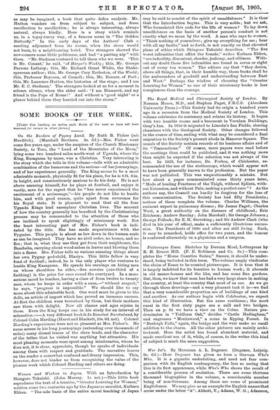[Under this heading we notice such Books of the week
as have not been OOOOO ved for review in other forms.] On the Borders of Pygmy Land. By Ruth B. Fisher (nee Hurditch). (Marshall Brothers. 38. 6d.)—Mrs. Fisher went some five years ago, under the auspices of the Church Missionary Society, to Toro, the "Land of the Mountains of the Moon," lying some two hundred miles north-west of Uganda, where the King, Kasagama by name, was a Christian. Very interesting is the story which she tells in this volume—tells with an admirable combination of the humorous and the serious—of her journeyings, and of her experiences generally. The King seems to be a most admirable monarch, physically fit for his place, for he is Oft. 3 in. in height, and conscientiously anxious to do his duty. He is not above amusing himself, for he plays at football, and enjoys it vastly, save for the regret that he "has never experienced the excitement of a scrimmage,"—his people do not like to hustle him, and with good reason, quite apart from reverence for his Royal state. It is pleasant to read that all the four Uganda Kings lead exemplary Christian lives. The account of how the country generally has benefited by the Christianising process may be commended to the attention of those who are inclined to speak slightingly of missionary work. Not the least interesting part of Mrs. Fisher's book is indi- dated by the title. She has made acquaintance with the Pygmies. This people is about as low down in the human scale as can be imagined. They have no civil order, no homes, and no fire; that is, what they use they get from their neighbours, the Bambuba, carrying about wood-ashes in leaves and blowing them into a flame. Mrs. Fisher tells us various amusing things about her own Pygmy god-child, Blasiyo. This little fellow is very fond of football ; indeed, he is the only player who ventures to hustle King Kasagama, He spends his earnings on hiring men on whose shoulders he rides,—five cowries (one-third of a farthing) is the price for once round the courtyard. In a more serious mood he teaches, having a class of from twelve to twenty men, whom he keeps in order with a cane,—" without respect," he says, "progress is impossible." We should like to say more about this admirable book. One word must be given to the dolls, an article of import which has proved an immense success. At first the children were torrorised by them, but their mothers saw them with delight. Now all classes and ages rejoice in them. Even the King keeps one in his study for an interval of ielaxation.—A very different book is In Remotest Barotseland, by Colonel Colin Harding (Hurst and Blackett, 10s. 6d. net). Colonel Harding's experiences were not so pleasant as Mrs. Fisher's. He came across in his long journeyings (extending over thousands of miles) many dismal traces of the slave trade, and the character of the tribes that he visited was anything but attractive. His most pleasing moments were spent among missionaries, whom he does not, it is clear, appreciate, though he speaks of individuals among them with respect and gratitude. The narrative leaves on the reader a somewhat confused and dreary impression. This, however, does not hinder us from recognising the value of the pioneer work which Colonel Harding and others are doing.


































 Previous page
Previous page